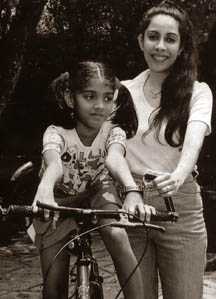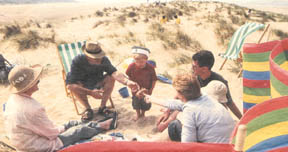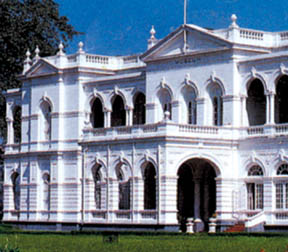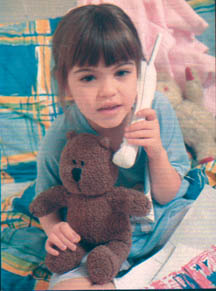
Today is Mother's Day
The second Sunday of May is accepted as Mother's Day. Although this
day hasn't been celebrated in Sri Lanka for a long time, it's certainly
catching up, with more and more people choosing to honour and celebrate
their mothers on this day.

Anna Jarvis of Philadelphia, USA is known as the founder of Mother's
Day. She spent the most part of her life trying to ensure that one day
of the year would be set aside to honour mothers. In 1915, the US
Congress asked the President of the country to proclaim Mother's Day as
a day to be remembered throughout the nation. Such a proclamation has
been issued by successive presidents, since then.
Most people wear a red rose or a pink carnation on Mother's Day if
their mother is still alive, or a white flower if she is dead. This
custom of wearing a flower was also initiated by Anna Jarvis.
Although observing Mother's Day is a relatively new development,
celebrating motherhood dates back to ancient times and many countries
have had different kinds of ceremonies to honour the mothers. One
example is the ten-day long festival called the Durga Pooja in India.
This festival honours Durga, the Divine Mother, who is known as the
mother of the goddess of arts, goddess of beauty and wealth, god of
wisdom and god of war.
During this festival, people take offerings of flowers, fruits and
vegetables or animals to the kovils, while children honour their own
mothers by taking gifts or greetings to them.
A holiday called 'Mothering Sunday' comes about midway through Lent
in England. On this occasion, grown-up people visit their mothers and
take gifts to them, while children present their mothers with gifts they
have made themselves.
The day for families
Some of you may be living with your parents and siblings in a
separate house, while some of you may also have your grandparents, and
even some of your aunts and uncles and cousins living together.

The former type of family, of just the parents and children, is
called a nuclear family, while the latter is called an extended family.
Nuclear or extended, a family is the most important unit in society and
comprises the people that are closest to you.
The importance of the family unit to society will be the focus on May
15, when the International Day of Families is celebrated around the
world.
The theme for this year, 'Changing Families: Challenges and
Opportunities', takes note of the importance the international community
attaches to families as basic units of society, and their concern for
the situation of families around the world. The theme raises public
awareness about critical issues concerning families.
Changes in family structures, demographic ageing, rise of migration
and the HIV/AIDS pandemic are four trends that have a major impact on
modern day families. They challenge the ability to fulfil basic
functions and needs of families regarding health, nutrition, shelter,
physical and emotional care and personal development.
Some of the activities that the United Nations has organised in
connection with the event are a consultative meeting on the family issue
and a workshop on HIV/AIDS and family well-being.
The day gives an opportunity to promote awareness of issues relating
to families and to promote action in this regard. It can become a
powerful mobilising factor on behalf of families in all countries, and
the opportunity can be used to demonstrate support for family issues
according to each society.
In 1993, the UN General Assembly decided that May 15 of every year
should be observed as the International Day of Families. In 1989, the
Assembly had proclaimed 1994 the International Year of the Family, to
increase awareness of family issues and improve the capability of
nations to tackle family-related problems with comprehensive policies.
International Museum Day on May 18
Most of you would have visited the Colombo National Museum or one of
the many other museums in Sri Lanka. A museum contains exhibits not only
to do with history and culture, but also relating to the natural world
including plants and animals, science and technology and a wide variety
of other subjects.

But what exactly is a museum? As defined by the International Council
of Museums (ICOM), it is "an institution in the service of society and
of its development". Museums are a window on our world. They play a
vital role in society by celebrating the differences among various
peoples.
The role of museums include creating closeness among a community by
giving value to a community's cultural heritage, and highlighting the
role of individuals and groups whose unique features and differences are
the cornerstone of a particular society. They contribute to cultural
exchanges, enrichment of culture and development of mutual
understanding, cooperation and peace among people.
The vital role museums play in human society will be recognised and
appreciated on May 18, when the International Museum Day is observed
around the world. The event, organised by the ICOM, will be held this
year under the theme 'Museums and Young People', as decided by the ICOM
Advisory Committee.
The theme raises awareness on how young people participate in
redefining the mission of protecting the heritage museums in the 21st
century, and how museums can contribute to shaping tomorrow's society by
working with young people.
The International Museum Day has been celebrated on or around May 18
since 1977. Over 50 countries took part in the celebrations last year.
Bringing the world closer
Telephones, mobile phones, satellite phones...none of these seem so
novel in this digital, high-tech era. Information Communication
Technology (ICT) and telecommunications have brought the world closer,
enabling human beings across the world to get in touch with each other
within minutes.

However, there are still parts of the world, even within our country,
where such modern developments are yet to arrive. Despite the massive
developments made in the sector, all people don't have equal access to
these technological advancements or the social and economic benefits
that they have brought.
A big gap exists between those who have virtually unlimited access to
information technologies and services, and those who have very limited
or no access at all. Narrowing this 'digital divide' and bringing the
benefits of ICT to all, will be one of the main areas of concern when
World Telecommunications Day is observed on May 17.
An organisation, which has made a huge contribution in the
telecommunication sector is the International Telecommunication Union (ITU),
the UN agency responsible for co-ordinating global communications. It
was set up 141 years ago, in 1865.
From the birth of the telegraph, through radio and television
broadcasting to satellite communications and the Internet, ITU's work
has helped harness the power of science and technology to fulfill a
basic human need for communication. |


